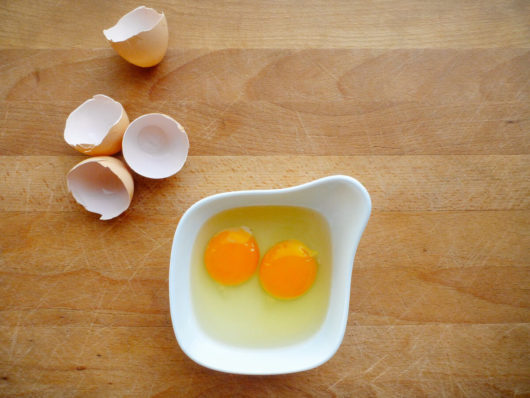
If you asked most people what color egg yolks are, they would likely answer yellow. Yolks have always been associated with the color yellow, which is unfortunate because backyard chicken keepers know better. Backyard chicken keepers know that yolks can and should be a bright, bold orange, and those bright, bold orange yolks are a sign of happy, healthy hens.
In an unscientific home experiment, I compared my pasture-foraging, insect-pecking, soil-scratching, whole grain-feeding chickens' yolks to the yolks of both their "free-ranging" and factory-farmed counterparts. The results were clearly visible: Yolks from my homegrown eggs were not only darker, but also fuller and thicker. Even the eggshells were denser and harder to crack.
But what's the big deal about orange yolks?
Besides being a coveted color, orange yolks are an indication of a well balanced and highly nutritious diet. A few things factor into the making of an orange yolk: xanthophylls, omega-3 fatty acids, and meats.
Xanthophylls are a class of carotenoids. Carotenoids are natural plant pigments found in many fruits and vegetables. It's often thought that beta-carotene, one of the more well-known carotenoids, is responsible for giving yolks the orange pigment that people associate with carrots. But in actuality, beta-carotene benefits yolks nutritionally, rather than colorfully.
The carotenoids that cause deeper yolk coloring are xanthophylls, which are more readily absorbed in the yolks. (Lutein is one such xanthophyll, and a lot of lutein means a lot more orange.) Xanthophylls are found in dark leafy greens like spinach, kale, and collards, as well as in zucchini, broccoli, and brussels sprouts.
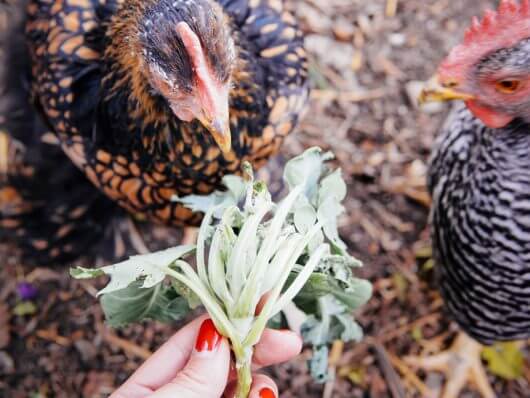
Omega-3 fatty acids are highly concentrated in flax seeds and sea kelp, which are both important components of my homemade whole grain chicken feed.
And did you know that chickens are not meant to be vegetarian, no matter what your premium carton of organic/grain-fed/cage-free eggs tells you? Chickens are omnivores by nature and their healthiest diets include meats, such as mealworms, beetles, grasshoppers, grubs, and whatever creepy-crawly they can pull out of the ground. I've even heard of chickens attacking and feeding on small rodents and snakes!
When you have all of these sources incorporated into a hen's healthy diet, the nutrients they consume are passed on to their eggs and concentrated in their yolks. According to Mother Earth News, which conducted its own egg analysis, and a more recent Pennsylvania State University study, pastured eggs contain higher levels of vitamins A, D, and E; more beta-carotene; and more omega-3s.
All this means is that a pastured egg is better for you. And that's one of the reasons we raise chickens, right?
So, how do we get those delightful dark orange yolks from our backyard chickens?
Let your ladies roam a pasture (or a garden — especially if you're digging over new beds — or even just a new patch of dirt in their chicken tractor) for an orange-boosting bug buffet. They like to dig through leaf piles and layers of mulch where grubs often hide.
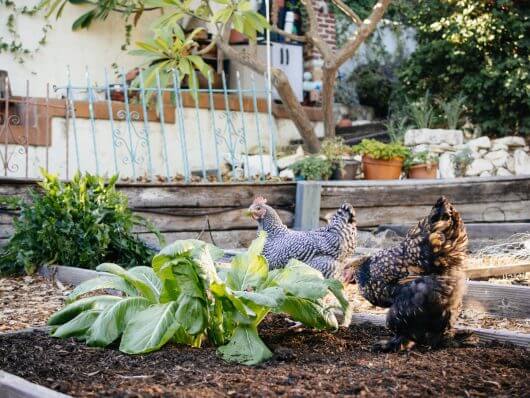
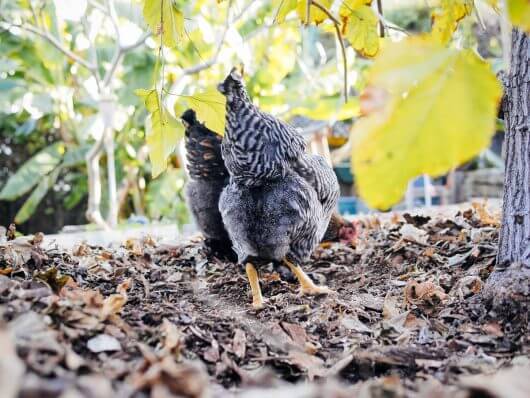
Give them plenty of fresh greens to increase the lutein in their yolks. The darker the green the better, so I often fix them a feast of edible amaranth (one of my favorite summer greens), kale, mustard, broccoli leaves, or whatever I happen to have growing in my garden. If it's the middle of winter and your garden greens are lacking, you can feed them alfalfa.
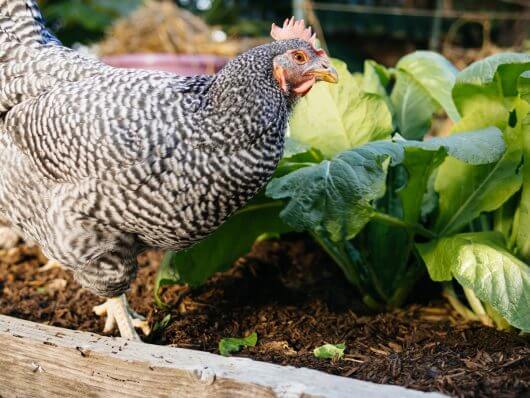
Rather than pulling all those (vitamin rich!) weeds out of your garden, let your chickens do the dirty work! They love to forage for dandelions, clover, oxalis, chickweed, purslane, and other plants that sometimes grow where they shouldn't. In fact, these types of weeds can be cultivated in a landscape especially for your flock, as they're low-maintenance and make a lovely, natural, and "wild" lawn that benefits other wildlife as well.
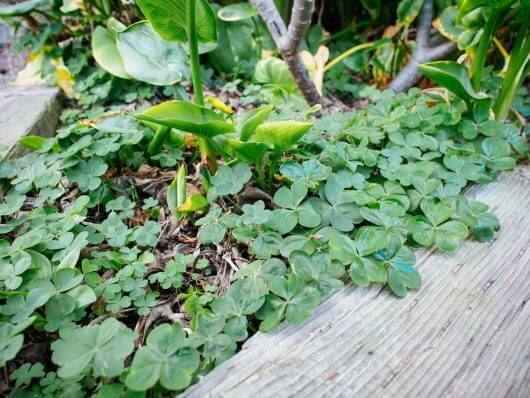

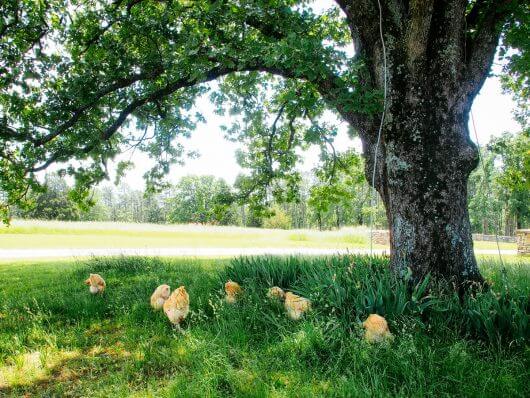
Chickens are very handy helpers at the end of the season when most of my greens have bolted and become aphid-ridden. Let the chickens clean up those plants before you toss them into the compost. It's a win for everybody! (Except the bugs, that is…)
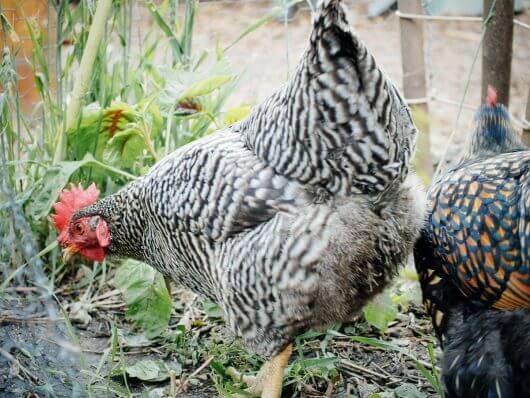
Speaking of compost, if you have an open compost pile, chickens do good work of turning over yard debris and kitchen scraps as they scratch and peck for grubs and worms. You can start a compost pile in a corner of their run or build a compost bin inside the run that's left open or covered as needed. The chickens will eat what they want, shred up your scraps for quicker composting, and keep themselves busy and entertained on days they can't free range.
(As an aside, don't be fooled by the cheater method that egg factories take, and simply feed your chickens more corn. While corn can give your yolks that nice golden color, it has little nutritional value.)
After a few weeks, you'll be so used to seeing orange yolks (the way most of us have been conditioned to see yellow yolks) that you might even think they haven't changed in color. Buy some eggs from the store and crack them into a bowl with your homegrown eggs — you'll be stunned at the difference!
This post updated from an article that originally appeared on March 7, 2013.
The post How to Get Those Delightful Dark Orange Yolks From Your Backyard Chickens appeared first on Garden Betty.
from Garden Betty https://ift.tt/2HC755k
No comments:
Post a Comment